
views
- To ensure your monkey has the healthiest diet and environment possible, be sure to do extensive research, as different monkey species require different care.
- Follow your state’s legal regulations regarding monkey cage dimensions, entryways, and locks. The larger the cage, the better.
- Provide fresh water and food daily in an easily accessible location of your monkey’s cage. Monkeys can eat monkey biscuits as well as most fruits and vegetables.
Preparing to Bring a Monkey Home

Research monkey species. Monkeys are in the order of primates, which is divided into families of New World primates (smaller, tree-dwelling monkeys from South America) and families of Old World primates (larger, ground and tree-dwelling monkeys from Asia and Africa). Each type of monkey has unique characteristics that affect how they fare as pets. Before you decide which type to get, conduct a lot of research on its characteristics. Read books, talk to owners, and get to know as many monkeys as you can in person. Squirrel monkeys, capuchins, spiders, and macaques are all types of monkeys people keep as pets. Some are more social, while others can be on the nervous side. These monkeys all have the same general care requirements, though larger monkeys will need more space than the smaller ones. Apes, such a chimpanzees, gibbons and orangutans are not monkeys and should not be kept as pets. They are much stronger than humans and can become quite dangerous in a domestic situation.
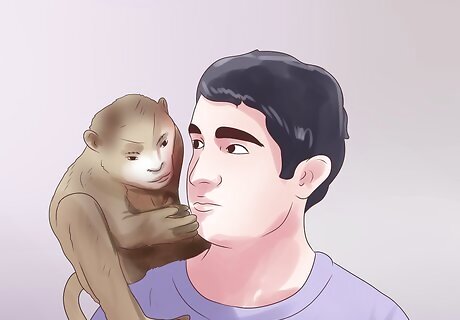
Be ready for a huge commitment. Bringing a monkey into your home is almost as big a commitment as deciding to have a child. Monkeys require attention all day, every day, and unlike cats and dogs, they cannot be left at home for extended periods of time. Once your monkey bonds with you, he will want to follow you wherever you go, and if you try to leave him by himself he will become bored, depressed and aggressive. Monkeys can live for 20 to 40 years, so bringing one home is a commitment to spend a significant portion of your life providing for your monkey's needs. Before you decide to get a pet monkey, ponder the following facts about life with a monkey: The monkey may become aggressive. When monkeys are babies, they are dependent and sweet, like baby humans. But when they reach sexual maturity, which happens around age 3 or 4, their behavior can become unpredictable. Monkeys are wild animals, and unlike cats and dogs, they have not been socialized to live with humans over thousands of years. Even a monkey who has bonded with a human as a baby may unpredictably bite and attack his owner or become quite difficult to live with as an adult. You'll have to say goodbye to your free time. Monkeys cannot be left to their own devices. They need constant attention and care, or else they can end up hurting themselves or someone else. And since they tend to bond with just one person, it's difficult to find a good monkey-sitter when you need some time to yourself. Your monkey may prevent you from having relationships you want. Monkeys tend to bond with just a few people. Having a monkey might prevent you from getting intimately involved with potential partners to whom the monkey has a negative reaction. Monkeys don't get along well with children, so having a monkey could keep you from starting a family. All that said, if you are one of the unique people with the temperament and discipline it takes to devote your life to the safety and care of your monkey, you may be rewarded with an amazing experience. Monkeys are intelligent, endlessly entertaining, and sometimes incredibly affectionate. Many people who share their lives with monkeys embrace the challenges and wouldn't trade their time with their beloved pets for anything.

Find out if it's legal to own a monkey in your location. It is illegal to have a pet monkey in many locations, and more locations will probably pass laws against the practice in the future. For this reason, it's difficult to move to a new location or travel across state lines / internationally when you own a monkey. It's illegal to bring a monkey into the US, so that means you can't travel abroad with your monkey and then try to bring him home. Some US states allow monkeys to be kept as pets, but have strict regulations as to the conditions under which the monkeys should be contained. Regulations regarding pet monkeys are different in countries outside the US. Look into the laws in your jurisdiction to find out whether there are any restrictions on which animals you can keep as pets.

Find a dealer or breeder with an excellent reputation. When you've decided that it's time to get a monkey, do research in your area to find a dealer or breeder with an established reputation as someone who can be trusted. They should have a USDA permit number, which is required of all breeders in the United States. Ask the dealer or breeder for the contact information of someone else who has bought a monkey from them. That way you can check into the monkey's health and behavior. Expect to pay upwards of $1,000 for a monkey of any species. A baby squirrel monkey can cost over $8,000. Older monkeys are less expensive, but much more difficult to handle once you bring them home. Before you make a purchase, visit with the monkey you'd like to buy and make sure you have a connection and can see yourself living with the monkey. Never purchase a monkey from outside the country. It's illegal to ship a monkey from outside the United States.
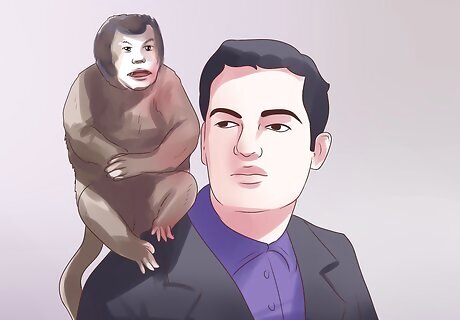
Find an exotic animals veterinarian nearby. Before you bring a monkey home, it's important to establish a relationship with an exotic animals veterinarian. A regular veterinarian will not have the necessary expertise and equipment to care for a monkey. Monkeys are prone to catching some of the same illnesses that humans have, as frequently as humans, so you can expect that your monkey will get sick from time to time. An exotic animals vet will also be a good resource for you when you have questions about your monkey's needs or behavioral issues.
Providing Food and Shelter
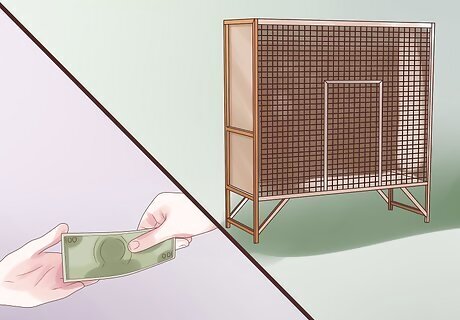
Build or buy a monkey cage. Your pet monkey might spend time out of his cage, but he'll need a place to stay at night and during times when you aren't available to play. A monkey's cage should be quite large, the bigger the better. Monkeys need plenty of room to run around, explore and play, especially if they're going to spend more than an hour or two at a time in the cage. If the cage is too small, the monkey will become agitated and potentially aggressive. You can purchase a monkey cage, but many owners prefer to build their own so they can customize them to their personal space. Wooden or steel poles and chain-link fencing make good materials for monkey cages. You may want to have an outdoor monkey cage as well as one indoors, or build a monkey cage attached to a heated outdoor shed that will provide shelter for the monkey. Be sure to follow your state's regulations regarding the dimensions, entryways and locks on monkey cages. In some cases the regulations differ according to what type of monkey you own. Monkeys like to climb, so provide a cage with plenty of height. Add branches, hanging ropes, and other features that will allow your monkey to climb around the cage.
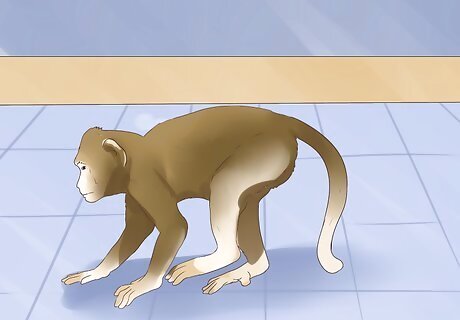
Monkey-proof your house. Most monkey owners allow their pets to spend time around the house, rather than just in their cages. Monkeys are curious, intelligent creatures that will get into everything available to them, so you'll need to take the time to remove items that could cause them harm or suffer damage. Since monkeys can climb, your monkey-proofing will have to be more extensive than baby-proofing would be. Don't let monkeys have access to anything with a cord. Make sure all electronics are out of their reach. They'll tear down curtains, knock over lamps and chew on furniture. Put away any items you aren't comfortable letting them destroy. You might want to have one or two designated "monkey rooms" that the monkeys are allowed to play in, and have the rest of the house be off-limits. Remember that monkeys can turn doorknobs and open windows, so if you're planning to let the monkey stay there unsupervised, you'll need to make sure the room is as secure as a cage would be, with locks and bars on the windows.

Keep the monkey's space clean. Monkeys keep their own bodies clean, but they leave a mess wherever they go. They aren't easy to house-train, and they excrete whenever and wherever they choose. Some people put diapers on baby monkeys, but this isn't usually possible once the monkeys mature. Rather, you should plan on cleaning up after your monkey at least once a day to maintain sanitary conditions in the cage and in your home.

Provide clean water bottles every day. Monkeys should always have access to fresh water that they drink from clean water bottles. You can use baby bottles for this purpose. Some monkeys may prefer to take their water from a dish, and some might like to have both options. However you administer the water, make sure there's no chance the monkey will run out.

Feed him monkey biscuits, fruits and vegetables. Monkey biscuits, or commercial monkey food, should be fed to your monkey every single day. These biscuits contain the right combination of vitamins and minerals to meet your monkey's needs. In addition to monkey biscuits, monkeys enjoy cut up fruit and fresh or steamed vegetables. You may also feed your monkey grasshoppers, mealworms, cooked chicken (with no spices), hard boiled eggs, yogurt, rice, grain and nuts. Do not feed your monkey anything that is considered "junk food" for a human. Sugary treats, ice cream, baked goods, snack foods, fast food, and raw meat should never be fed to a monkey. Depending on the type of monkey you have, you may also need to supplement his diet with extra vitamins. Monkeys kept inside may need extra vitamin D to account for the lack of sun exposure.
Socializing and Training the Monkey
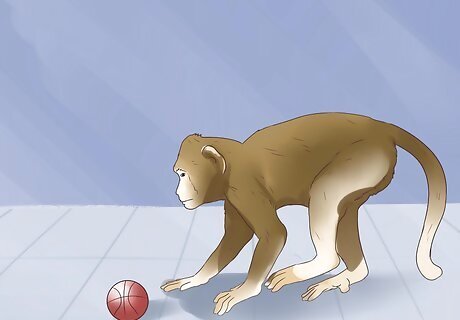
Give the monkey plenty of toys and stimulation. Monkeys need a lot of variety and stimulation in order to be happy. In the wild, they spend most of their time climbing around trees and looking for food. Simulate that experience in your monkey's cage and around the house by providing lots of interesting things for the monkey to play with and pull apart. Try hiding the monkey's food inside a box, or in a container with small holes that the monkey can reach one hand into. The monkey will have fun trying to figure out how to get to the food. Give the monkey stuffed animals, balls, and other toys to throw around and play with. Switch out the toys frequently so the monkey won't get bored.
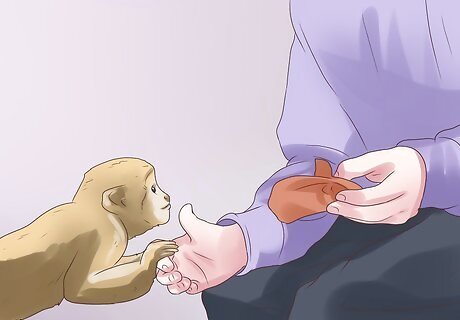
Play with the monkey every day. Monkeys are social creatures, and when they're left alone for long periods of time they grow very unhappy. Spend a few hours playing with your monkey every single day. As you bond with your monkey, he'll start trusting you enough to climb up your body and give you hugs or even kisses. If you have more than one monkey, less social time is necessary. Many monkeys are happier living with others of their kind. If you can afford more than one, they'll live happily together in the same cage.
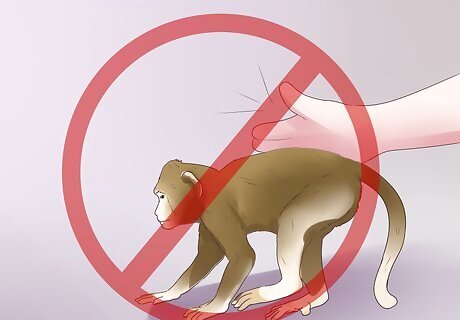
Never punish a monkey. Hitting or yelling at a monkey will cause him to become afraid of you. It's also completely ineffective if you want to control your monkey's behavior. Remember that monkeys are wild, and they can't always be trained to do exactly what you want them to do. From time to time they'll exhibit behaviors you might not like. Punishing them will only hurt your relationship. The best way to deal with negative behaviors is to make sure the monkey isn't lacking something that he needs to be content. Does he have enough stimulation every day? Is he getting plenty of exercise? Are you playing with him enough? Monkeys that are afraid or agitated might bite from time to time. Again, you can't deal with this by punishing the monkey. Instead, get to know his moods and learn to leave him alone when he might be in the mood to bite.
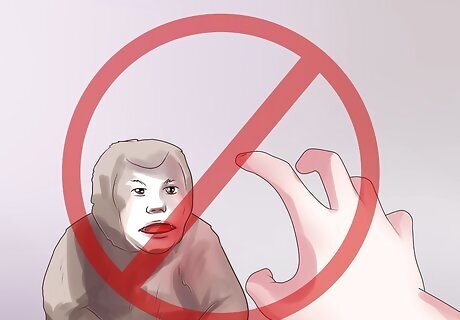
Do not let the monkey play with strangers. It's not a good idea to take your monkey out in public, or invite people to your home to play with him. Monkeys are too unpredictable. Your monkey can get taken away in an instant if an accident happens. If your monkey so much as scratches someone, an Animal Control officer has the right to confiscate him to test him for rabies. When exotic animals are confiscated, they are often euthanized, since there is no law requiring a quarantine period for exotic animals (as there is for domesticated animals like cats and dogs). If you have to go out of town and leave the monkey in someone else's care, make sure it's someone the monkey has met many times and has come to trust. Leaving the monkey with a total stranger could be stressful for him and lead to dangerous consequences.
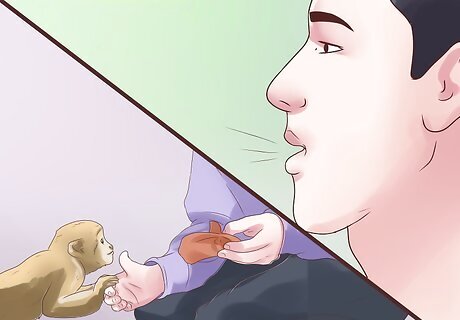
Have fun communicating with your monkey. Say his name when you feed him or offer them a toy, so he'll begin to learn it. When he responds, give him a treat and praise him. Teach him commands by showing him how to act. For example, if you say "dance," start hopping around and dancing. When he learns a trick, give him treats and praise him.















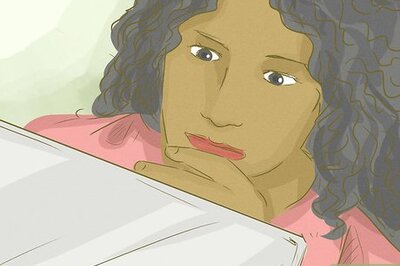



Comments
0 comment